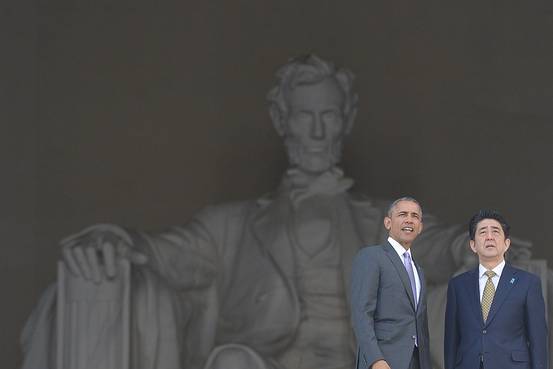Courting controversy for his refusal to issue a formal apology from Japan to South Korea and other Asian neighbors whose nationals were conscripted into service as ‘comfort women’ during World War II, Japanese prime minister nevertheless embraced the United States in a joint address to the US Congress Wednesday:![]()
![]()
![]()
My dear friends, on behalf of Japan and the Japanese people, I offer with profound respect, my eternal condolences to the souls of all American people that were lost during World War II.
Though Abe expressed deep repentance for Japanese actions that caused suffering to Asian neighbors, and though Abe said that Japan must not avert its eyes from that, he bluntly noted that ‘history is harsh’ and that ‘what’s done cannot be undone.’ Presumably, that includes the abduction of women forced into sexual slavery by the Japanese army during World War II across much of Asia, chiefly in Korea, which remained under Japanese occupation from 1910 to 1945. Even discussing the issue today is still widely controversial in both Japan and South Korea, but it’s enough of an affront to South Korea that South Korean president Park Geun-hye has only met with Abe once — and apparently, she was less than impressed with Japanese diplomacy.
* * * * *
RELATED: Japan is once again an essentially one-party country
* * * * *
Abe’s refusal, and the refusal of prior Japanese prime ministers, to apologize has caused diplomatic tension with China and, more importantly for US purposes, South Korea, which US officials hope can become a closer Japanese ally in their mutual quest to balance China’s growing regional power. Though the US-Japanese relationship is strong today, it’s odd, upon reflection, that a Japanese official would apologize to the country that deployed not one, but two, atomic bombs on Japan while remaining recalcitrant vis-a-vis Korea.
Mike Honda, a Democratic member of the US House of Representatives from California and himself an American of Japanese descent, brought Lee Yong-soo, a Korean woman forced into service as a ‘comfort woman’ in 1944 at the age of 16, to Abe’s congressional address in protest.
Mistrust between the two countries runs deep. Surveys show that Abe is more unpopular throughout South Korea today than North Korea’s leader, Kim Jong-un.
The apology issue was the most contentious of a broad portfolio of policy issues between the United States and Japan, as Abe continues his red-carpet visit to the United States, which included a personal tour of Washington’s monuments with US president Barack Obama (pictured above with Abe) and a state dinner on Tuesday night.
Greater cooperation between Tokyo and Seoul is a top US priority in its quest to engineer a security, economic and political counterweight to limit China’s ability to dominate the region.
South Korea joins Japan, Singapore, Brunei, Vietnam, Malaysia and Taiwan among the east and southeast Asian countries currently negotiating the Trans-Pacific Partnership. The United States, Mexico, Canada, Australia, New Zealand, Peru and Chile have joined them in what could become the most comprehensive multilateral trade agreement in world history.
The negotiations have been grinding forward for nearly a decade, though the United States joined them only in 2008 and Japan joined only in early 2013, shortly after Abe and his Liberal Democratic Party of Japan (LDP, or 自由民主党, Jiyū-Minshutō) won a landslide victory in the December 2012 elections, a feat that Abe duplicated in last December’s subsequent elections.
It was never assured that Abe, who has attempted to shake up Japan’s economy with a mix of fiscal stimulus, monetary easing and reform, would bring his country into the TPP negotiations. The LDP, which has dominated Japanese politics and government for much of its postwar history, is a party of competing factions, many of which are protectionist or economically nationalist. It’s a testament to Abe’s continuing political strength, both within the LDP and more widely in Japan, that the country is pushing forward to join the TPP. In that endeavor, Japan and the United States have found common ground over stricter protocols for enforcing intellectual property law.
As US president Barack Obama’s administration continues its ‘pivot’ to Asia, its strategic relationships with Japan, South Korea and The Philippines have become more important than ever. In a world where the United States can no longer make unilateral demands of its allies, and where the United States no longer desires to take the leading role in every security situation worldwide, its east Asian allies in particular are enhancing their defense capabilities.
In Japan, Abe is pushing to revise Japan’s longstanding ‘Article 9,’ the constitutional provision that essentially limits the creations of a true military that can project international force. It’s been a longtime goal of the hawkish Abe to amend the Japanese constitution to allow a more aggressive force than the current Self-Defense Force.
While that’s good news for the United States in the long-run, Abe’s hopes to reinvigorate the Japanese military are met with equal alarm in Beijing and Seoul. Abe’s decision to visit the controversial Yasukuni shrine in December 2013 didn’t help matters, considering that it’s a shrine to wartime leaders considered war criminals by China and South Korea.
Park, herself a hawkish conservative, whose father, Park Chung-hee, served as South Korea’s authoritarian leader during Korea’s economic boom in the 1960s and 1970s, was also elected in December 2012.
